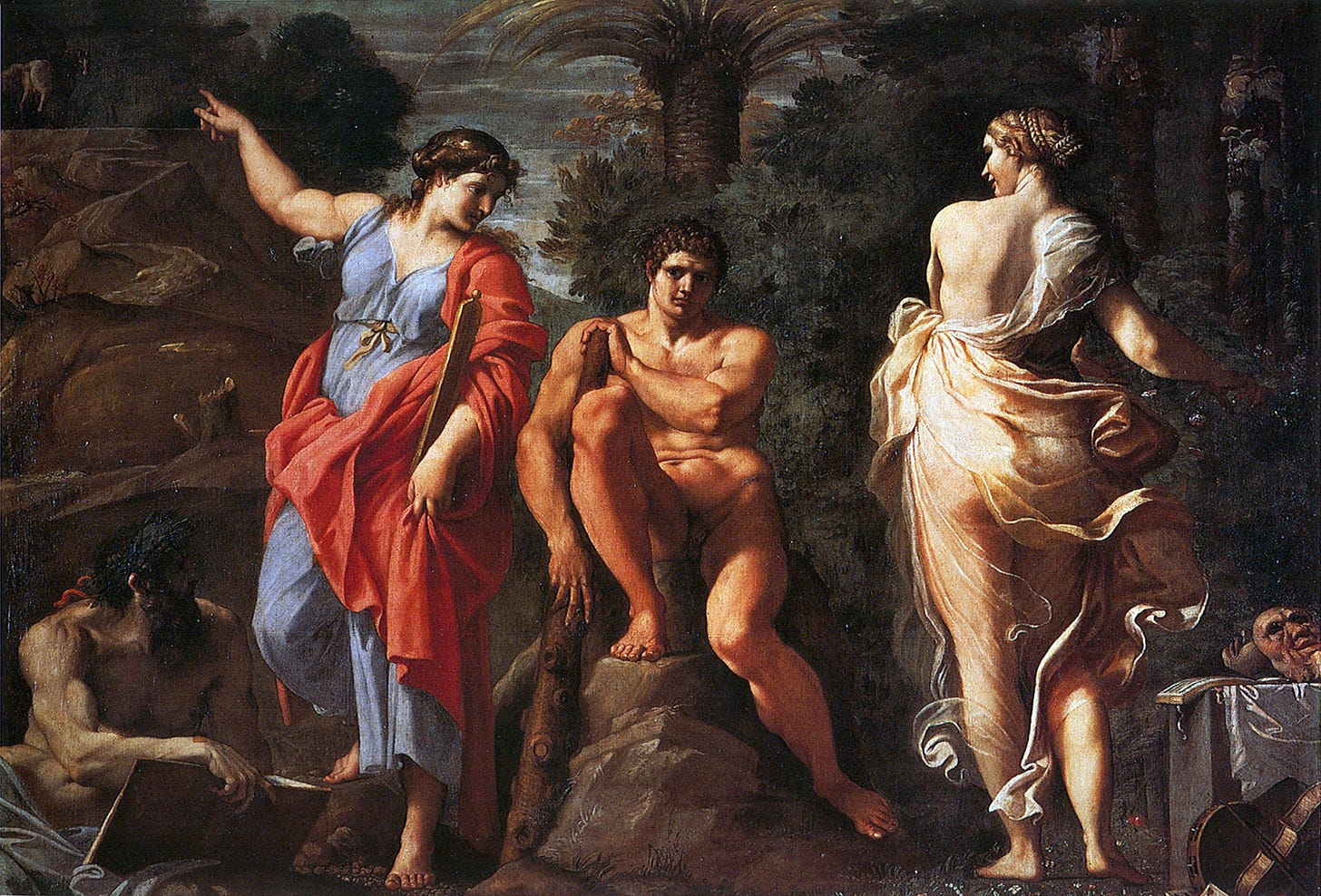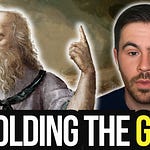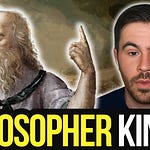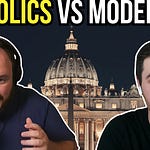The Choice of Hercules.
As a young man blinded by rage, Heracles killed his over-critical music tutor with a single blow. After this incident, understandably, he took himself off into the forest to think about his life and reflect on what he was going to do next?
To his surprise, two ladies met him in the forest; both were dazzlingly beautiful and taller than ordinary women. The first stood before him in sensuous colours and glittering jewelry, while the other was clad in simple white. The first was called Kakia or (vice), although her friends knew her as "happiness." She said: "Choose me Hercules, and your life shall be a ceaseless pleasure, and no effort of mind or body will be demanded of you." Then the other spoke up, Aretê or Virtue, and she said: "Choose me Hercules, and you will have the honour of your countrymen, but I cannot promise a life without labour, for no man may reap where he does not sow…"
Heracles deliberated on the choice, and the benefits which the two Goddesses offered. Finally, he chose the path of Virtue — both the bitter and the sweet. Because of this choice, he faced 12 trials, madness, entering the underworld, and the death of his family but afterwards was deified by Zeus and became a God - the highest honour a mortal can receive.
Mental Health in Crisis.
Epictetus made the point in one of his lectures that Hercules could never have been Hercules if he stayed in bed all day. Hercules was Hercules because he faced such great adversity. Adversity was what made him great, and yet we all avoid and complain about our own hardship?
The Choice of Hercules is ancient and deep story, first recorded by Xenophon in his Memoropilia and comes from at least 400 BC in Ancient Greece, and God knows where before that. The story warns of the temptation of an easy life of pleasure and reward without any effort and the moral difficulty in choosing a life of honourable pain and effort that may or may not lead to achievement. We all know this when our parents as kids poke and prod us to do the right thing and not take the easy way out. But often this kind of simple truth has often become laughable in the modern world.
But what is not laughable is that we have a severe mental health crisis at the moment amongst young people, and the data is very clear on that fact. So the question is, why? Why, in a time when people are more entertained, well-fed, and safer than ever, less under threat, and outside the food chain, are we more distressed than ever? The answer to this question lies in the choice of Hercules and Modern Neuroscience.
The Answer From Neuroscience.
"Wickedness can be had in abundance easily: smooth is the road and very nigh she dwells. But in front of Virtue the gods immortal have put sweat: long and steep is the path to her and rough at first; but when you reach the top, then at length the road is easy, hard though it was." - Hesiod, Works and Days.
They didn't have neuroscience back in 400 BC, so they had to make do with the insights of literature and Philosophy. Now, in the 21st century, we have empirical research into the brain's functioning that can help us elucidate the central importance of the choice of Hercules and the philosophy within for mental health.
One of the most exciting discoveries of modern neuroscience is that pleasure and pain are located in the same part of the brain and behave like a balance; tipping the brain to the side of pleasure causes a mirror symmetric tip to the side of pain because the brain wants to maintain balance, homeostasis. (This is a crude description, and if you want to see Dr. Anna Lembke explain what she calls 'The Pleasure/pain balance', then watch this video here.) The basic idea is summed up in the old expression: what goes up must come down, and the further we go up, the further we go down.
Dopamine and Mental Health.
"High levels of Dopamine achieved without effort will destroy a person" -Andrew Huberman, American Neuroscientist.
Dopamine is the molecule of drive, motivation, and pursuit and is described as the 'molecule of more'; it makes us want more of what makes us feel good. Often times people think, Dopamine is about reward, but Dopamine is about pursuit and craving of reward (The reward itself is more of an opioid in nature). Dopamine supply is finite but also renewable. This means you can 'use up’ your supply of Dopamine but, if you wait, it will return to baseline levels.
When we experience unnaturally high levels of Dopamine from exogenous pleasures, drugs, alcohol, and highly-rewarding technology like social media or video games, we create a phasic burst of Dopamine, a sudden increase in the supply, and thus when the high wears off we fall below the baseline level. When we stop using an exogenous supply of Dopamine, we experience 'Dopamine free-fall' which is essential discomfort, dysphoria and irritation.
The temptation then is to engage in what is called ‘Dopamine Stacking’, which is when you experience ‘Dopamine Free-fall’ and then immediately add another highly rewarding behaviour on top to prevent the Dopamine drop. Think when you are doom scrolling Instagram so you change to Youtube for something more rewarding. If we continue to do this for a long time, our brains downgrade our own supply of Dopamine because we have what is called an ‘exogenous supply’, and then when we stop using our drug of choice we will experience the universal symptoms of withdrawal: anxiety, depression, irritability, and insomnia, or in other words, the classic symptoms of mental illness.
Dopamine is essential for mental health. Mental health can be defined as the ability to set and pursue goals (most people enter therapy because they feel 'stuck', either they don’t have goals, or they can’t achieve the goals which they are pursuing). Without Dopamine, pursuing goals is impossible. Rats with a healthy amount of Dopamine will pursue food in their cage even over an electric shock pad. However, a Dopamine deprived rat won't even get up to eat if a food bowl is placed beside it, and will eventually starve to death within arm's length of a decent meal.
The mechanics of Dopamine show how an easy life of pleasure with no effort can lead to more pain, discomfort, and ultimately mental health problems. Pleasure is psycho-physiologically costly, and thus the industries of pleasure in the modern world, fast food, rewarding technologies, and endless luxuries, are making us sick and depressed.
What Can We do about it?
It's convenient to say that this is a modern problem caused by the market. In some ways it is. However as the story of Hercules's choice points out, this is a perennial human problem - a choice between the lower and higher angels of our nature? I don't see any way a human being can be mentally healthy in the 21st century without some awareness of this problem and the functioning of their physiology.
Understanding the mechanism of Dopamine and the pleasure/pain balance leads one to conclude that you should spend your Dopamine points wisely and not pursue rewards that lead to no outcome, in religious language, actions that bear no fruit. We are all in danger of living a life of pointless distraction and making ourselves feel good without producing anything to really feel good about. Making the decision to pursue the path of Virtue, effort and reward, rather than reward without effort, is deeply challenging. In my opinion, this is the moral fight of our generation: taking on the responsibility of self-regulating to avoid self-destruction.
The problem is that reward is now de-coupled from effort, and we can get endless pleasurable rewards for free. Naturally, as mammals, we seek pleasure and avoid pain, but part of maturing and becoming successful as a human being is being able to endure pain to get real rewards, to achieve, from the French Achever, meaning "gain as a result of effort." No effort, no achievement.
The choice of Hercules is more relevant than ever and is essential to well-being, to function well as a human being, which is what well-being really means. Now the environment is being engineered by other humans to distract us and make us addicted, which is making that choice even, to keep us living the easy life. We have to make this decision voluntarily, each of us.
We need a culture and leaders who encourage us to overcome cheap pleasures to face honourable pains, to grow and develop ourselves as people. However, we all face the choice of Hercules every day when we experience that Dopamine free-fall and face the choice to go on and become more indebted to pleasure or to say ‘no’ and accept the cold and unpalatable suffering. A tough decision to make, one which I struggle with myself daily, but it is an important decision - which path will you choose?
Did you enjoy this article? Share it with somebody!
This will be the last post as I usually take the month of August off to refresh myself, gather new ideas, and guests and generally sort my shit out. So you will hear from me again on September 1st!
Warm Regards,
Mahon.












